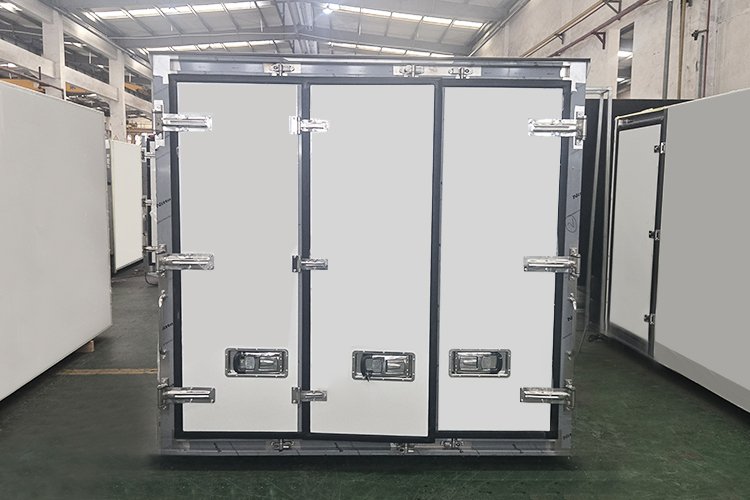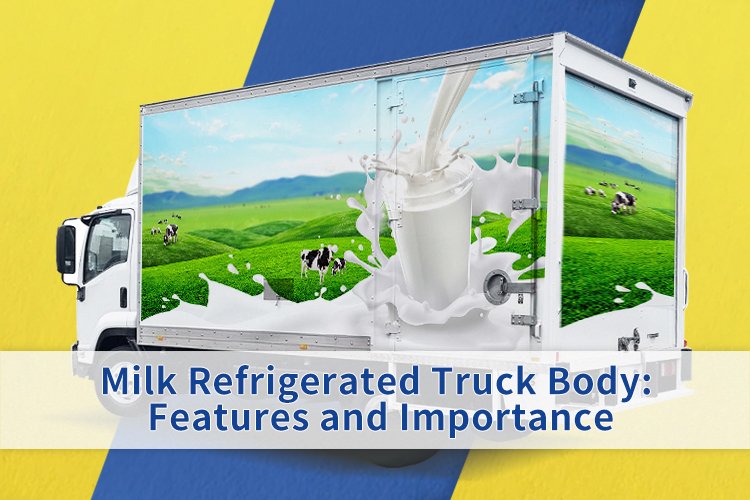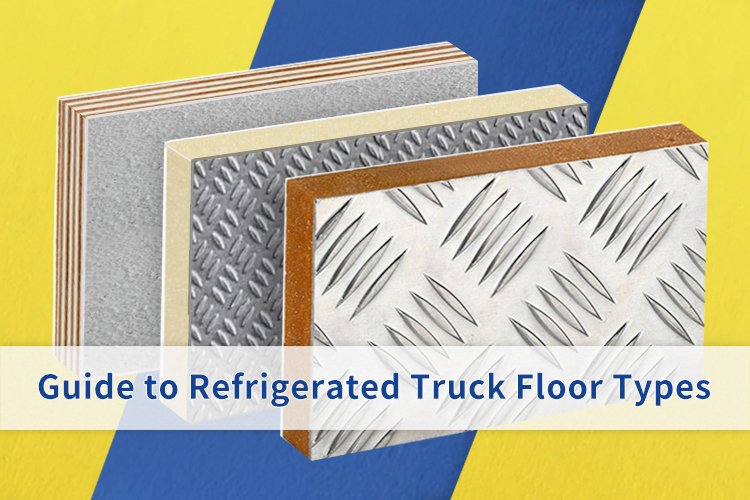Milk Refrigerated Truck Body: Features and Importance
The refrigerated truck body significantly impacts milk freshness and plays a crucial role in dairy transportation. It must operate across varying environments and temperatures, requiring an excellent refrigeration system and superior insulation properties. Multiple factors must align to ensure milk reaches consumers in optimal condition. Therefore, selecting the right refrigerated truck body is paramount. Composite Box stands as the premier solution provider for milk refrigerated truck bodies.
The Importance of Refrigerated Truck Bodies for Milk
The refrigerated truck body for milk is primarily responsible for transporting milk under suitable conditions. It must comply with relevant laws and regulations, ensure stable temperatures, prevent spoilage and contamination, and guarantee consumers receive healthy milk.
Milk refrigerated trucks form the most critical link in the milk cold chain, requiring precise temperature control maintained between 2°C and 8°C. From departure at the dairy farm to final delivery to the customer, low temperatures must be sustained. Without refrigerated trucks, the quality of milk would be severely compromised.

Milk Refrigerated Truck Body Design
The refrigerated truck body for milk is a composite structure that determines whether dairy products like milk can be transported stably. Composite Box possesses over 15 years of experience in designing refrigerated truck bodies. We skillfully utilize various composite materials while ensuring compliance with legal regulations. This enables the refrigerated truck body to meet requirements for thermal insulation, high strength, and hygiene.
When designing milk refrigerated trucks, we primarily use polyurethane foam as the insulation layer, maintaining a thickness between 50 and 100 millimeters while controlling the thermal conductivity below 0.02 W/(m·K). The specific thickness is determined by local climate and environmental conditions. We can confidently state that even in 40°C heat, our temperature control systems maintain stability without excessive power consumption. Beyond this, we prioritize long-term thermal performance, ease of cleaning, and hygiene maintenance. Achieving these goals while ensuring sustained vehicle performance over time is paramount.
Our design also prioritizes lightweight construction to reduce energy consumption, enhance transport efficiency, and optimize thermal efficiency in composite vehicle bodies. Utilizing fiberglass polyurethane composite materials reduces overall vehicle weight by 30%. Recognizing the frequent door openings required for milk delivery, we address heat ingress through specialized interior structural design, ensuring comprehensive cold chain efficacy.
The Application of Refrigerated Trucks in Dairy Products
Refrigerated trucks play a vital role in the transportation of dairy products. From the farm to the consumer, their use is indispensable throughout the entire process. Dairy products undergo four critical stages, and the application of refrigerated trucks is detailed below for each stage.
Within the dairy supply chain, refrigerated trucks serve as indispensable “temperature guardians,” ensuring consistent product quality from the point of production to final consumption.
- Collection Phase: Freshly milked dairy products from farms must be immediately transported to processing facilities. Here, refrigerated trucks utilize precise temperature control mechanisms to inhibit microbial proliferation, preserve initial purity, and prevent any quality degradation.
- Processing and Packaging: After pasteurization and container filling, dairy products proceed to warehousing or direct delivery to retailers. Specialized refrigerated transport maintains a stable low-temperature environment, eliminating potential risks from temperature fluctuations.
- Distribution Phase: From logistics hubs to supermarket networks, refrigerated trucks’ high adaptability and precise scheduling ensure dairy products reach shelves in peak condition for immediate customer purchase.
- End-to-Consumer: After products enter stores, cold chain infrastructure continues its role. Convenience stores and supermarkets utilize built-in cooling systems to extend freshness until consumers take them home to enjoy.
Advantages of Using Composite Box Milk Refrigerated Truck Bodies
Superior Thermal Insulation
Our insulation materials and structural design ensure your refrigerated truck body maintains consistent thermal performance year-round. Maintaining ideal temperatures is effortless.
Meeting Hygiene and Safety Standards:
Hygiene is paramount for milk refrigerated truck bodies. During transport, interior surfaces utilize 304 stainless steel or high-molecular polymers, featuring ultra-smooth finishes with surface roughness ≤0.8μm for easy cleaning and sterilization. Silver ion antibacterial coatings are applied, complemented by UV lamps for enhanced sterilization.
Regulatory Compliance:
Composite Box provides globally compliant refrigerated truck bodies meeting local standards, ensuring safe dairy transportation while adhering to refrigeration industry regulations.
Flexible Design:
We customize refrigerated truck bodies to your specifications, including 3-door and 4-door configurations with distinct zones. Multi-temperature truck body designs are supported.
Chassis Compatibility:
We design bodies to integrate seamlessly with your truck chassis. Leveraging decades of truck design expertise, we guarantee perfect compatibility between our box truck bodies and your vehicles.
Environmental Optimization:
Composite Box is committed to environmental sustainability. We are passionate about reducing carbon emissions, with mitigating global warming at the core of our mission. Our products are intrinsically aligned with this purpose.







